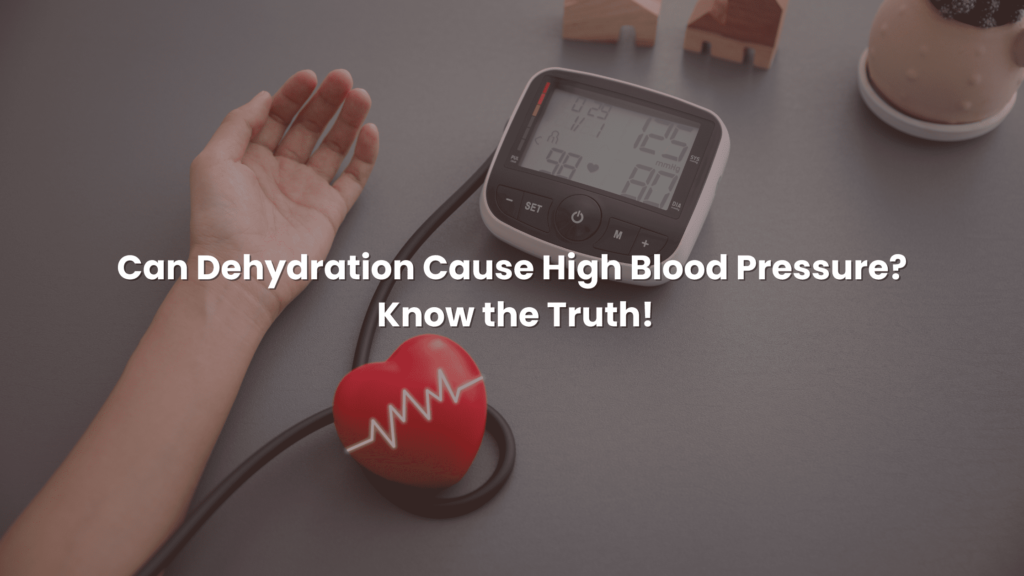Let’s discuss about dehydration and its impact on blood pressure. Can dehydration cause high blood pressure? Learn how hydration affects your cardiovascular health and get practical tips for staying hydrated.
Table of Contents
What Is Dehydration?
Dehydration is a condition that occurs when the body loses more fluids than it takes in, leading to a deficiency of water and other essential electrolytes needed for normal bodily functions. Water is crucial for various physiological processes, including maintaining body temperature, lubricating joints, and facilitating digestion.
How Dehydration Occurs?

1. Inadequate Water Intake
- Insufficient Drinking: Not drinking enough water throughout the day is the most common cause of dehydration. This can be due to neglect, lack of access to clean water, or underestimating the body’s fluid needs.
- Ignoring Thirst Signals: Sometimes, people ignore or do not recognize their body’s signals for thirst, leading to prolonged periods without adequate hydration.
2. Excessive Fluid Loss
- Sweating: Engaging in intense physical activity, especially in hot or humid environments, increases sweating, which leads to significant fluid loss.
- Illness: Conditions such as fever, vomiting, and diarrhea can cause the body to lose fluids rapidly. Infections and illnesses that induce these symptoms can quickly lead to dehydration if fluids are not replenished.
- Diuretics: Certain medications and substances, such as diuretics (used to treat high blood pressure), caffeine, and alcohol, can increase urine output and lead to dehydration.
3. Environmental Factors
- Hot Weather: High temperatures can cause the body to sweat more to cool down, leading to fluid loss.
- Dry Air: Environments with low humidity levels can also increase fluid loss through evaporation from the skin and respiratory tract.
4. Physical Activity
- Exercise: During exercise, the body produces sweat to regulate temperature, which can lead to significant fluid loss, especially if the activity is prolonged and intense.
- Outdoor Activities: Activities such as hiking, running, or sports played outdoors can exacerbate fluid loss due to exposure to the elements.
5. Diet
- Low Fluid Content: Consuming a diet low in water-rich foods (such as fruits and vegetables) can contribute to inadequate hydration.
- High Salt Intake: Diets high in salt can increase the body’s need for water to balance sodium levels, potentially leading to dehydration if fluid intake is not sufficient.
Also Read: How Dog Probiotics Can Transform Your Pet’s Health!
Signs and Symptoms of Dehydration
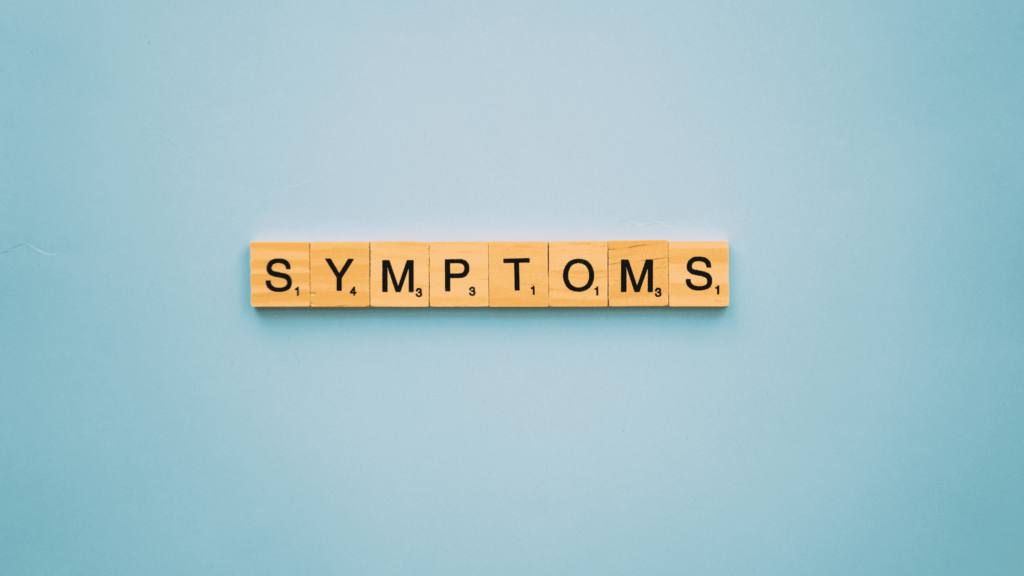
1. Mild to Moderate Dehydration
- Thirst: The most obvious sign, signaling the body’s need for more fluids.
- Dry Mouth and Skin: Reduced saliva production and dry skin are early signs.
- Dark Urine: Concentrated urine that appears dark yellow or amber is a common indicator of dehydration.
- Fatigue and Dizziness: Lack of adequate fluids can lead to decreased energy levels and lightheadedness.
- Headache: Dehydration can cause headaches due to reduced fluid levels in the brain.
2. Severe Dehydration
- Rapid Heartbeat: The heart may pump faster to maintain blood pressure.
- Sunken Eyes: A visible sign of significant fluid loss.
- Low Blood Pressure: Dehydration can lead to reduced blood volume, causing low blood pressure.
- Confusion and Irritability: Severe dehydration can affect cognitive function and mood.
- Lack of Sweat and Tears: In extreme cases, the body may stop producing sweat and tears.
What Is High Blood Pressure?
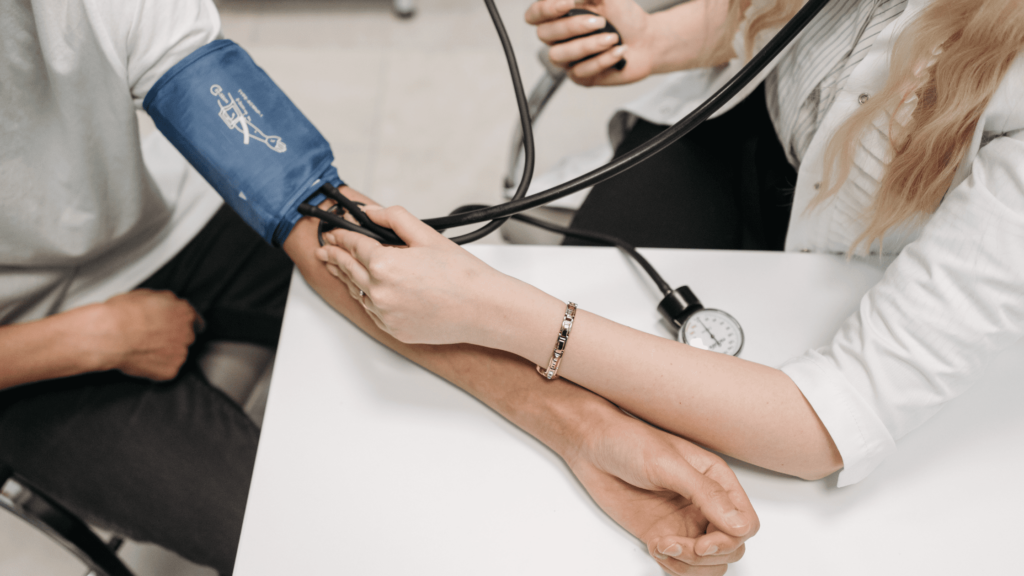
High blood pressure, also known as hypertension, is a condition where the force of the blood against the artery walls is consistently too high.
- Systolic Pressure: The first (higher) number, which measures the pressure in your arteries when your heart beats.
- Diastolic Pressure: The second (lower) number, which measures the pressure in your arteries when your heart rests between beats.
A typical normal blood pressure reading is less than 120/80 mm Hg. Hypertension is generally defined as having a consistent blood pressure reading of 130/80 mm Hg or higher.
Causes of High Blood Pressure
- Genetics: Family history can play a significant role in developing hypertension.
- Diet: High salt intake, excessive alcohol consumption, and diets low in potassium can contribute to high blood pressure.
- Lifestyle: Sedentary lifestyle, obesity, and smoking are significant risk factors.
- Chronic Conditions: Conditions such as diabetes, kidney disease, and sleep apnea can lead to hypertension.
- Age: Blood pressure can increase with age because of the stiffening of arteries.
- Stress: Chronic stress can also become a reason for high blood pressure.
Symptoms and Risks Of High Blood Pressure
Hypertension is often called the “silent killer” because it usually has no obvious symptoms until it has caused significant damage to the body. Some people may experience headaches, shortness of breath, or nosebleeds, but these symptoms aren’t specific and usually don’t occur until hypertension has reached a severe or life-threatening stage.
Significance of High Blood Pressure
- Heart Health
- Increased Workload on the Heart: Hypertension forces the heart to work harder to pump blood, leading to the thickening of the heart muscle and potentially causing heart failure.
- Coronary Artery Disease: High blood pressure can damage the arteries, leading to the buildup of plaque, narrowing, or even blocking blood flow to the heart muscle, which can cause chest pain (angina) or heart attacks.
- Stroke
- Brain Damage: Hypertension can cause blood vessels in the brain to burst or clog more easily, leading to a stroke. It can also contribute to the formation of blood clots in the arteries leading to the brain.
- Kidney Damage
- Impaired Kidney Function: The kidneys filter excess fluid and waste from the blood, a process that requires healthy blood vessels. Hypertension can damage the blood vessels in the kidneys, leading to kidney disease or failure.
- Vision Loss
- Damage to Blood Vessels in the Eyes: Hypertension can damage the tiny blood vessels in the eyes, leading to retinopathy, which can cause vision loss or blindness.
- Aneurysm
- Weakened Blood Vessels: High blood pressure can weaken the walls of blood vessels, causing them to bulge (aneurysm).
- Metabolic Syndrome
- Cluster of Disorders: Hypertension is often a part of metabolic syndrome, a cluster of conditions that include increased waist circumference, high blood sugar levels, high triglycerides, and low HDL cholesterol levels.
- Dementia and Cognitive Impairment: There is a link between hypertension and cognitive decline. Over time, high blood pressure can lead to dementia by causing arteries that supply blood to the brain to narrow or clog. This can also lead to transient ischemic attacks (mini-strokes) and more severe types of stroke.
Similar: 5 Ways Whey Protein Side Effects Liver!
Managing High Blood Pressure
- Lifestyle Changes: Adopting a healthy diet (low in salt, rich in fruits and vegetables), regular physical activity, maintaining a healthy weight, limiting alcohol intake, and quitting smoking.
- Medications: When lifestyle changes aren’t enough, medications such as diuretics, ACE inhibitors, beta-blockers, and others may be prescribed.
- Regular Monitoring: Keeping track of blood pressure through regular check-ups can help manage and control hypertension effectively.
How Dehydration Can Affect High Blood Pressure?
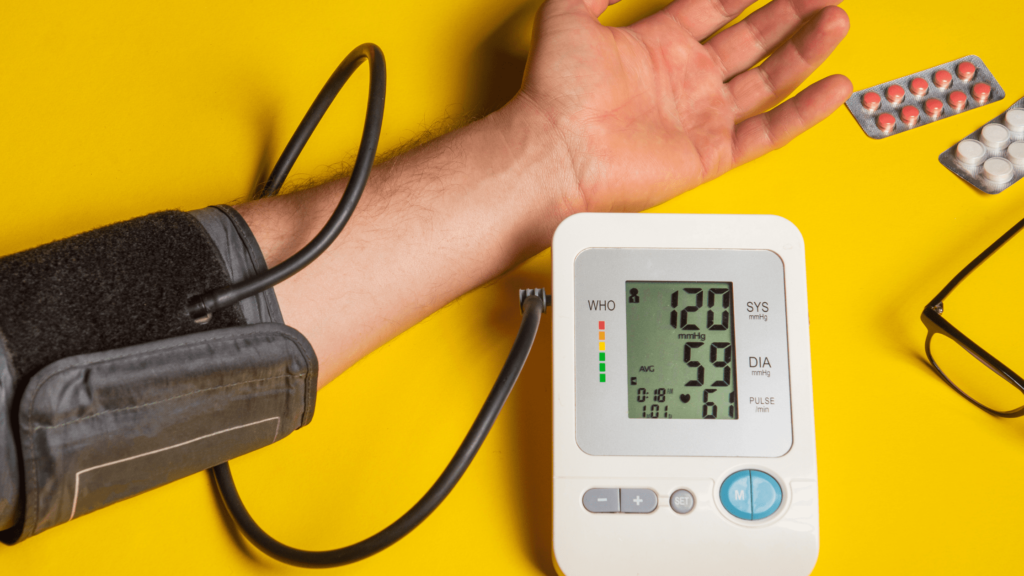
- Reduced Plasma Volume:
- Mechanism: Plasma, the liquid component of blood, is primarily made up of water. When the body is dehydrated, the amount of plasma in the blood decreases.
- Consequences: This reduction in plasma volume leads to a decrease in overall blood volume. Lower blood volume means less blood is circulating through the body, which can cause the heart to pump harder to maintain adequate circulation.
2. Increased Blood Viscosity:
- Mechanism: Dehydration causes the blood to become thicker and more viscous due to the lower water content.
- Consequences: Thicker blood is more challenging for the heart to pump, increasing the strain on the cardiovascular system. This can lead to higher blood pressure as the heart works harder to circulate the more viscous blood.
Suggested: Unlock Your Potential: The Magic of the 30 Minute Cardio Workout!
Impact on Blood Vessels
- Vasoconstriction:
- Mechanism: Dehydration can cause blood vessels to constrict (narrow) as the body attempts to maintain blood pressure and ensure that vital organs receive adequate blood flow.
- Consequences: Vasoconstriction increases the resistance against which the heart must pump, raising blood pressure. Chronic vasoconstriction can lead to long-term hypertension and damage to the blood vessels.
2. Decreased Blood Flow:
- Mechanism: With reduced blood volume and constricted blood vessels, the flow of blood to various parts of the body, including muscles and organs, is decreased.
- Consequences: Reduced blood flow can lead to decreased oxygen and nutrient delivery to tissues, impairing their function and potentially leading to damage over time.
Impact on Heart Function
- Increased Heart Rate:
- Mechanism: To compensate for the lower blood volume and maintain adequate circulation, the heart rate increases.
- Consequences: A higher heart rate (tachycardia) places additional stress on the heart, which can lead to fatigue and decreased efficiency of the heart over time. This can exacerbate existing cardiovascular conditions.
2. Increased Cardiac Output Demand:
- Mechanism: The heart must work harder to pump the thicker, more viscous blood through constricted blood vessels.
- Consequences: The increased workload can lead to hypertrophy (thickening of the heart muscle), particularly in the left ventricle, which can contribute to heart failure if the condition persists.
3. Electrolyte Imbalance:
- Mechanism: Dehydration often results in an imbalance of electrolytes (such as sodium, potassium, and magnesium), which are crucial for normal heart function.
- Consequences: Electrolyte imbalances can lead to arrhythmias (irregular heartbeats) and other cardiac issues. For example, low potassium levels (hypokalemia) can cause life-threatening heart rhythm disturbances.
Some Scientific Studies On the Link Between Dehydration And High Blood Pressure

Studies Supporting the Link
- Study by the University of Arkansas (2005):
- Findings: This study found that dehydration can lead to significant increases in blood pressure. The researchers noted that when subjects were dehydrated, their blood pressure rose due to the body’s compensatory mechanisms, such as increased vasoconstriction and heart rate to maintain blood flow and pressure.
- Conclusion: The study supports the idea that dehydration can cause acute elevations in blood pressure.
- Research Published in “The American Journal of Clinical Nutrition” (2001):
- Findings: Researchers discovered that dehydration leads to an increase in plasma osmolality (concentration of particles in the blood) and a reduction in blood volume. These changes trigger the release of vasopressin, a hormone that causes blood vessels to constrict and the kidneys to retain water, both of which can elevate blood pressure.
- Conclusion: The study provides evidence that dehydration can cause physiological changes that lead to higher blood pressure.
- Study in “Hypertension Research” (2008):
- Findings: This study examined the effects of dehydration on blood pressure in older adults and found that dehydration significantly increased systolic blood pressure. The researchers suggested that this might be due to age-related changes in blood vessel elasticity and the body’s ability to regulate fluid balance.
- Conclusion: The findings suggest that dehydration can particularly impact blood pressure in older adults, supporting the connection between dehydration and high blood pressure.
Studies Refuting the Link
- Research by the Mayo Clinic (2011):
- Findings: A study conducted by the Mayo Clinic found no significant long-term relationship between moderate dehydration and sustained high blood pressure. While acute dehydration did lead to temporary increases in blood pressure, these changes were not found to be significant enough to cause chronic hypertension.
- Conclusion: The study suggests that while dehydration may cause short-term increases in blood pressure, it is unlikely to lead to chronic hypertension.
- Journal of Human Hypertension (2015):
- Findings: This study assessed the impact of hydration status on blood pressure among a diverse cohort and found that although dehydration did cause temporary spikes in blood pressure, individuals who stayed hydrated did not show significant long-term differences in hypertension prevalence compared to those who were occasionally dehydrated.
- Conclusion: The study indicates that chronic high blood pressure is more influenced by factors such as diet, exercise, and genetics than by hydration status alone.
- Clinical and Experimental Hypertension (2017):
- Findings: Researchers evaluated the effects of hydration on blood pressure among patients with pre-existing hypertension and found that while proper hydration improved overall cardiovascular health, it did not significantly alter blood pressure levels compared to baseline measurements.
- Conclusion: The study concluded that while hydration is important for overall health, it may not have a direct and significant impact on controlling high blood pressure in hypertensive patients.
Practical Tips for Staying Hydrated
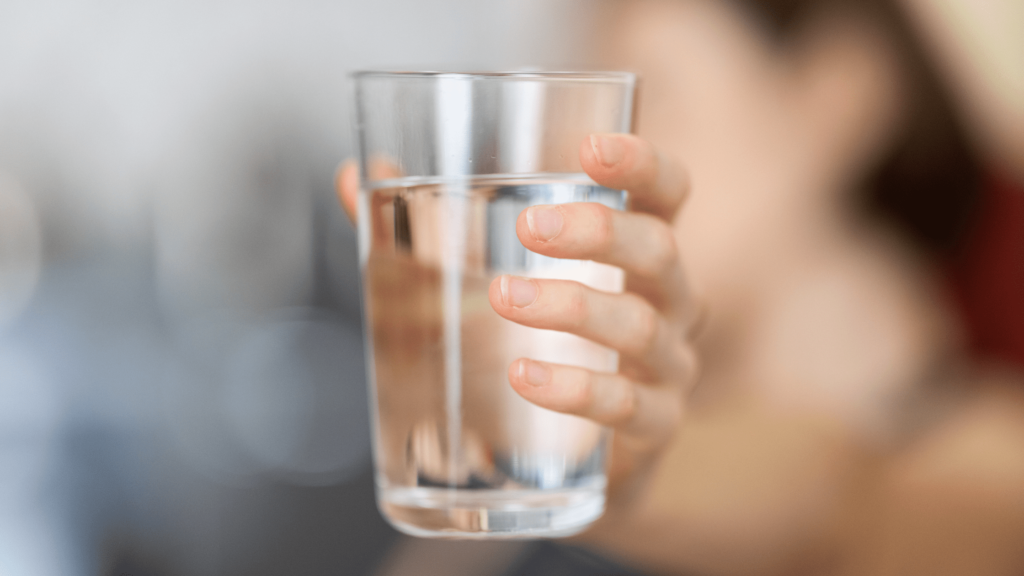
1. Set a Hydration Goal
- Daily Intake: Aim for at least 8-10 glasses (about 2-2.5 liters) of water a day, adjusting for factors such as age, weight, climate, and activity level.
- Personalized Goal: Consider using a hydration calculator to set a goal tailored to your specific needs.
2. Carry a Water Bottle
- Convenience: Keep a reusable water bottle with you throughout the day to make drinking water more convenient.
- Reminder: A visible water bottle serves as a reminder to drink more frequently.
3. Drink Water Before Meals
- Routine: Make it a habit to drink a glass of water before each meal to ensure you are getting regular hydration throughout the day.
Do You Know?: The Ultimate Guide to Probiotics for Women: Benefits, Sources, and Tips!
4. Set Reminders
- Technology: Use smartphone apps or alarms to remind you to drink water at regular intervals.
- Workplace Habits: Set reminders on your computer or place sticky notes on your desk as prompts to drink water.
5. Infuse Your Water
- Flavor: Add natural flavors such as slices of lemon, lime, cucumber, or fresh herbs like mint to make your water more appealing.
- Variety: Experiment with different combinations to keep your water interesting and enjoyable.
6. Eat Water-Rich Foods
- Fruits: Include water-rich fruits like watermelon, oranges, strawberries, and grapes in your diet.
- Vegetables: Consume vegetables high in water content such as cucumbers, celery, lettuce, and tomatoes.
7. Track Your Intake
- Journaling: Keep a hydration journal to track how much water you drink each day.
- Apps: Use mobile apps designed to help track your water intake and set daily goals.
8. Start and End Your Day with Water
- Morning Routine: Drink a glass of water first thing in the morning to kickstart your hydration for the day.
- Evening Routine: Have a glass of water before bed to stay hydrated overnight (unless advised otherwise due to sleep issues or frequent urination at night).
9. Drink Before, During, and After Exercise
- Pre-Workout: Drink water before starting your workout to ensure you are hydrated.
- During Exercise: Sip water throughout your exercise session, especially if it’s longer than 30 minutes.
- Post-Workout: Replenish fluids lost through sweat by drinking water after you finish exercising.
10. Pay Attention to Signs of Dehydration
- Thirst: Respond promptly to feelings of thirst.
- Urine Color: Monitor your urine color; light yellow indicates proper hydration, while dark yellow suggests you need more water.
- Dry Mouth and Skin: These can be early signs of dehydration.
11. Adjust for Climate and Activity Level
- Hot Weather: Increase your water intake during hot or humid weather to compensate for fluid loss through sweat.
- Physical Activity: Drink more water if you are physically active or have an active job that increases your fluid needs.
12. Limit Dehydrating Beverages
- Caffeine: Moderate your intake of caffeinated beverages such as coffee and tea, which can have a diuretic effect.
- Alcohol: Drink water alongside alcoholic beverages to counteract their dehydrating effects.
13. Use Electrolyte Solutions
- Hydration Packs: Consider using electrolyte solutions or sports drinks if you are sweating heavily or engaging in prolonged physical activity.
- Balanced Intake: Choose options that are low in sugar and provide essential electrolytes like sodium and potassium.
Answer To The Main Question
Can Dehydration Cause High Blood Pressure?
Based on the evidence presented, dehydration can cause temporary increases in blood pressure due to the body’s compensatory mechanisms, such as reduced blood volume and vasoconstriction. However, while acute dehydration may elevate blood pressure temporarily, it is less clear whether dehydration alone can lead to chronic hypertension. Therefore, staying properly hydrated is important for overall health and can help maintain stable blood pressure levels, but chronic high blood pressure is influenced by a range of factors including diet, exercise, stress, and genetic predisposition.
Additional Resources for Learning More About Dehydration and High Blood Pressure
Articles
1. “Dehydration and Hypertension: How Fluid Intake Affects Blood Pressure“– American Heart Association
– A comprehensive article detailing the relationship between hydration status and blood pressure management.
2. “The Impact of Hydration on Blood Pressure” – Mayo Clinic
– Explains the effects of dehydration on blood pressure and overall cardiovascular health.
3. “Understanding the Effects of Dehydration on the Human Body” – WebMD
– An informative article on how dehydration affects various bodily functions, including blood pressure.
Books
1. “Your Body’s Many Cries for Water” by F. Batmanghelidj, M.D.
– This book explores the importance of hydration and how water intake affects overall health, including blood pressure regulation.
2. “The DASH Diet Action Plan: Proven to Lower Blood Pressure and Cholesterol Without Medication” by Marla Heller, MS, RD
– While focusing on the DASH diet, this book provides insights into how diet and hydration can impact blood pressure.
3. “The Salt Fix: Why the Experts Got It All Wrong–and How Eating More Might Save Your Life” by Dr. James DiNicolantonio
– Discusses the balance of electrolytes and fluid intake, shedding light on how salt and hydration affect blood pressure.
Websites
1. American Heart Association (www.heart.org)
– Offers extensive resources and articles on managing blood pressure, including the role of hydration.
2. Mayo Clinic (www.mayoclinic.org)
– Provides reliable information on the effects of dehydration and practical tips for maintaining good hydration.
3. WebMD (www.webmd.com)
– Contains a variety of articles and resources on dehydration, blood pressure, and overall cardiovascular health.

